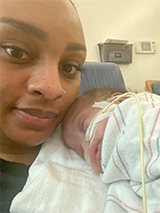

Setting a new record for a procedure once considered theoretical, Children’s Hospital of Philadelphia (CHOP) is celebrating the birth of its 2,000th fetal surgery patient. Using highly complex surgical interventions to repair birth defects in the womb, experts in CHOP’s Richard D. Wood Jr. Center for Fetal Diagnosis and Treatment have been leaders in the field for more than a quarter century.
“Forty years ago, fetal surgery was considered experimental, but now it has become the standard of care, offering a better quality of life to many children and families,” said fetal surgery pioneer and CHOP Surgeon-in-Chief N. Scott Adzick, MD, founder and director of the Wood Center for Fetal Diagnosis and Treatment. “A quarter of fetal surgeries ever performed have been done at CHOP, and we continue to refine our techniques so that we can improve even more patients’ lives.”
Unmatched Experience
Established in 1995, CHOP’s Wood Center for Fetal Diagnosis and Treatment is the largest and most comprehensive fetal program in the world, having cared for more than 27,000 expectant parents from all 50 states and more than 70 countries. The team has experience treating some of the most complex fetal anomalies in the world, many so rare that a physician may encounter only one or two cases in a career. Leaders in CHOP’s center were among the founders of modern fetal medicine and worked alongside other leading surgeons and researchers in experimental laboratories to develop the techniques that are used clinically today.
Each week, highly sophisticated surgical teams at CHOP repair spina bifida and other birth defects in the womb, remove fetal tumors, and perform minimally invasive procedures to treat complications in fetal twins. These procedures minimize the damage caused by birth defects and, in some cases, can prevent harm from occurring altogether.
A milestone birth

At her 20-week ultrasound, Yasmin Southerland learned that her daughter, Carter, had myelomeningocele, the most severe form of spina bifida. The condition, in which part of the developing spine fails to close properly, often leads to weakness or paralysis below the location of the defect, leading to an inability to walk unassisted and a loss of bladder and bowel control.
Through a combination of consultations with local specialists and online research, Yasmin learned about fetal surgery for spinal column repair in those diagnosed prenatally with spina bifida.
“I didn’t even know it was possible to perform surgery while she was still in the womb,” Yasmin said.
Prenatal Repair of Spina Bifida
In her research, she came across CHOP and learned of its reputation as a leader and pioneer in fetal surgery. The team at the Wood Center for Fetal Diagnosis and Treatment had achieved great success with fetal surgery for decades, having led the landmark MOMS study that demonstrated the benefits of fetal surgery for spina bifida over postnatal repair. The study, and its follow up nearly a decade later, showed that repairing the spinal column in utero increased the likelihood a child would walk independently, improved gross and fine motor skills, and reduced the need to divert fluid from the brain with a shunt.
Although Yasmin and Carter’s father, Malcolm, lived in Kernersville, NC, they decided to travel 450 miles to Philadelphia to have fetal surgery at CHOP.
At 25 weeks pregnant, Yasmin came to CHOP, where surgeons performed fetal surgery and successfully closed the opening in Carter’s spine. Two weeks later, Carter was born prematurely at 27 weeks. She spent 3 months in the CHOP Newborn/Infant Intensive Care Unit (N/IICU) for issues related to prematurity, while Yasmin and Malcolm stayed nearby at the Ronald McDonald House. Carter was then transferred to a NICU closer to home and was discharged June 2.
“Even though we were far from home, we are so glad we came to CHOP because we had an amazing experience."”
Yasmin continued: “I was very nervous before the surgery, but ultimately I wanted to do whatever I could do to improve Carter’s prognosis. Now that her surgery was a success, I feel more empowered to deal with any challenges that come up in the future, especially knowing that I have CHOP in my back pocket.”
Featured in this article
Specialties & Programs

Setting a new record for a procedure once considered theoretical, Children’s Hospital of Philadelphia (CHOP) is celebrating the birth of its 2,000th fetal surgery patient. Using highly complex surgical interventions to repair birth defects in the womb, experts in CHOP’s Richard D. Wood Jr. Center for Fetal Diagnosis and Treatment have been leaders in the field for more than a quarter century.
“Forty years ago, fetal surgery was considered experimental, but now it has become the standard of care, offering a better quality of life to many children and families,” said fetal surgery pioneer and CHOP Surgeon-in-Chief N. Scott Adzick, MD, founder and director of the Wood Center for Fetal Diagnosis and Treatment. “A quarter of fetal surgeries ever performed have been done at CHOP, and we continue to refine our techniques so that we can improve even more patients’ lives.”
Unmatched Experience
Established in 1995, CHOP’s Wood Center for Fetal Diagnosis and Treatment is the largest and most comprehensive fetal program in the world, having cared for more than 27,000 expectant parents from all 50 states and more than 70 countries. The team has experience treating some of the most complex fetal anomalies in the world, many so rare that a physician may encounter only one or two cases in a career. Leaders in CHOP’s center were among the founders of modern fetal medicine and worked alongside other leading surgeons and researchers in experimental laboratories to develop the techniques that are used clinically today.
Each week, highly sophisticated surgical teams at CHOP repair spina bifida and other birth defects in the womb, remove fetal tumors, and perform minimally invasive procedures to treat complications in fetal twins. These procedures minimize the damage caused by birth defects and, in some cases, can prevent harm from occurring altogether.
A milestone birth

At her 20-week ultrasound, Yasmin Southerland learned that her daughter, Carter, had myelomeningocele, the most severe form of spina bifida. The condition, in which part of the developing spine fails to close properly, often leads to weakness or paralysis below the location of the defect, leading to an inability to walk unassisted and a loss of bladder and bowel control.
Through a combination of consultations with local specialists and online research, Yasmin learned about fetal surgery for spinal column repair in those diagnosed prenatally with spina bifida.
“I didn’t even know it was possible to perform surgery while she was still in the womb,” Yasmin said.
Prenatal Repair of Spina Bifida
In her research, she came across CHOP and learned of its reputation as a leader and pioneer in fetal surgery. The team at the Wood Center for Fetal Diagnosis and Treatment had achieved great success with fetal surgery for decades, having led the landmark MOMS study that demonstrated the benefits of fetal surgery for spina bifida over postnatal repair. The study, and its follow up nearly a decade later, showed that repairing the spinal column in utero increased the likelihood a child would walk independently, improved gross and fine motor skills, and reduced the need to divert fluid from the brain with a shunt.
Although Yasmin and Carter’s father, Malcolm, lived in Kernersville, NC, they decided to travel 450 miles to Philadelphia to have fetal surgery at CHOP.
At 25 weeks pregnant, Yasmin came to CHOP, where surgeons performed fetal surgery and successfully closed the opening in Carter’s spine. Two weeks later, Carter was born prematurely at 27 weeks. She spent 3 months in the CHOP Newborn/Infant Intensive Care Unit (N/IICU) for issues related to prematurity, while Yasmin and Malcolm stayed nearby at the Ronald McDonald House. Carter was then transferred to a NICU closer to home and was discharged June 2.
“Even though we were far from home, we are so glad we came to CHOP because we had an amazing experience."”
Yasmin continued: “I was very nervous before the surgery, but ultimately I wanted to do whatever I could do to improve Carter’s prognosis. Now that her surgery was a success, I feel more empowered to deal with any challenges that come up in the future, especially knowing that I have CHOP in my back pocket.”
Contact us
Ashley Moore
Richard D. Wood Jr. Center for Fetal Diagnosis and Treatment